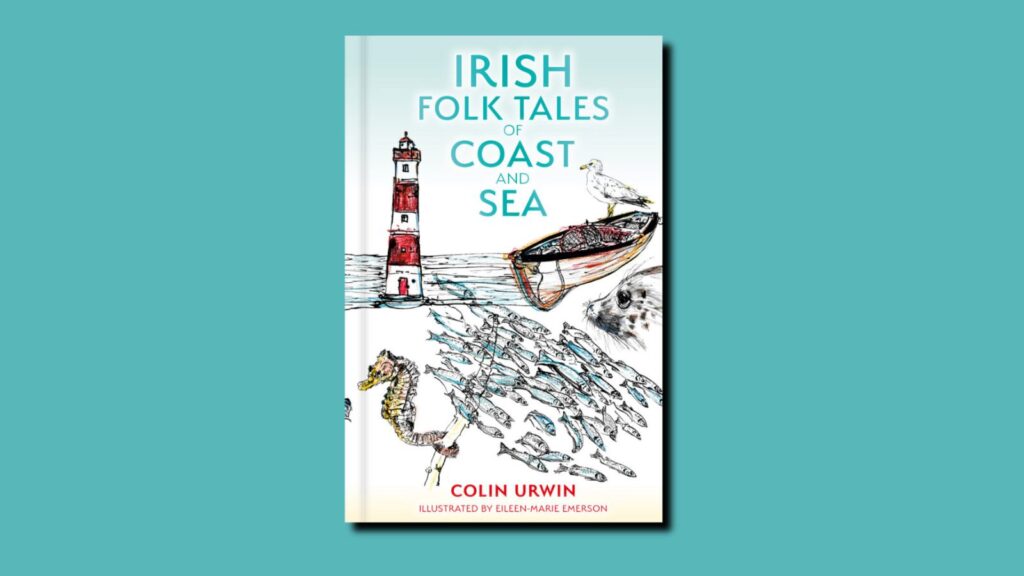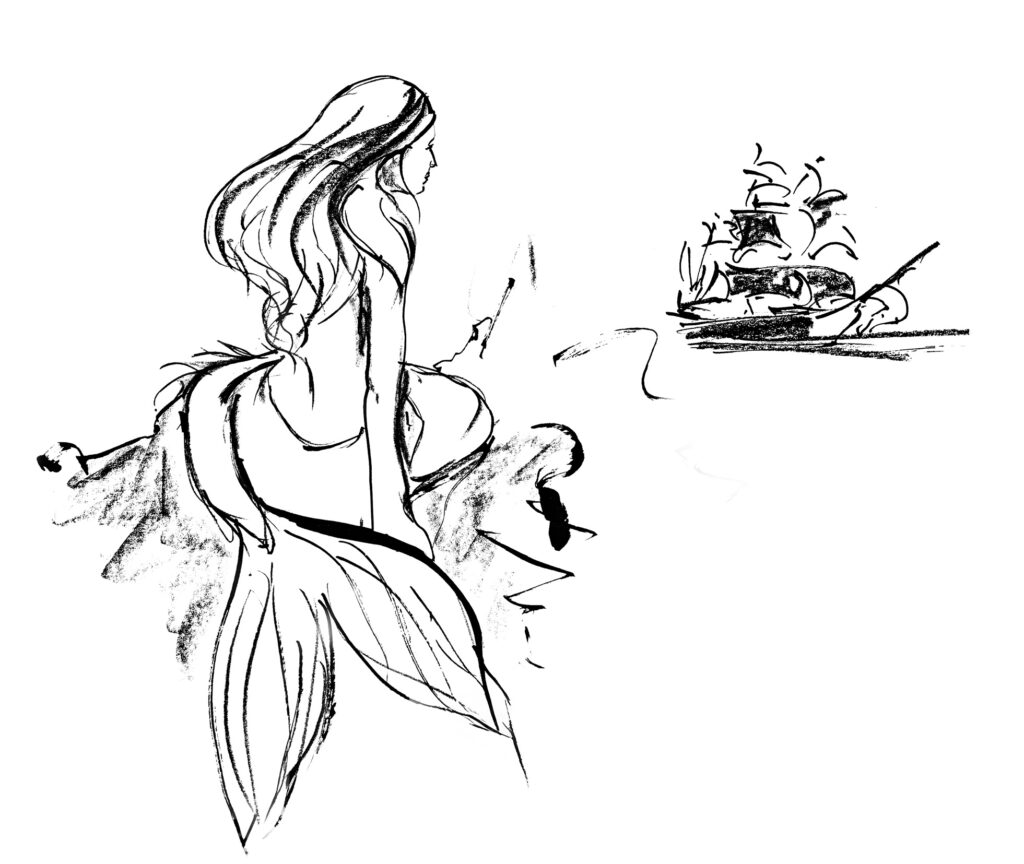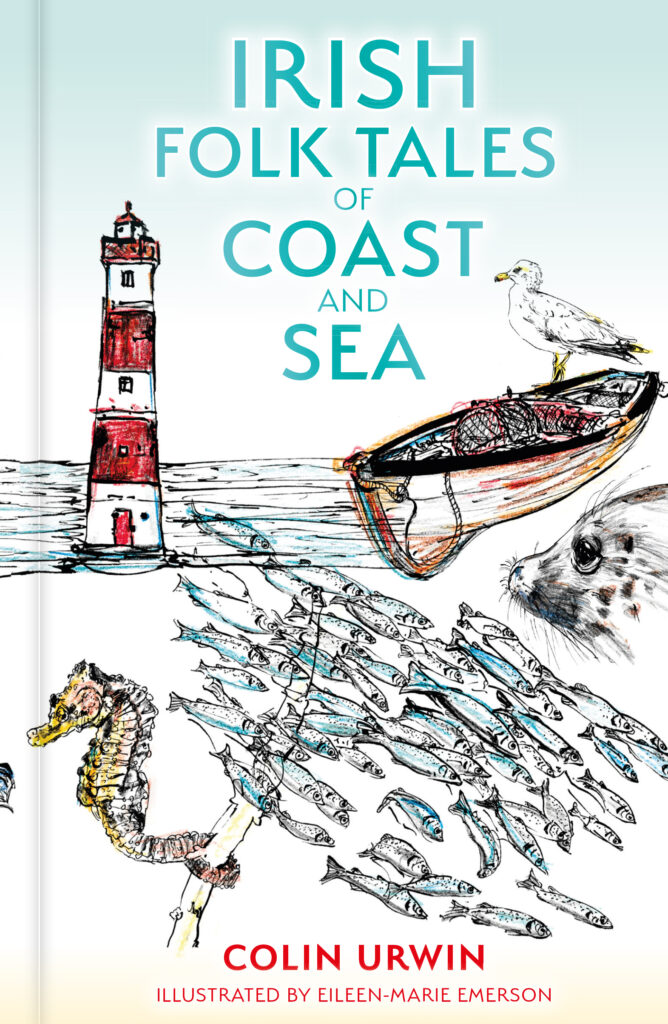
Thady Rua O’Dowd and the Mermaid
A story from Irish Folk Tales of Coast and Sea, by Colin Urwin, illustrated by Eileen-Marie Emerson
This story is a very well-known and much-loved Sligo folktale. Versions appear in many publications and various online sources. I have heard my friend and fellow storyteller Masako Carey, from Japan but resident in County Antrim, tell her own beautiful adaptation. Those well versed in traditional mermaid and selkie lore will be aware that it follows a very familiar, not to say clichéd, storyline. This may have ruled it out for this book, except that I found the twist in the tail (excuse the pun) markedly different. As has already been mentioned, mermaid and selkie stories probably have a common root. It has been suggested that this may have been borne from early encounters with long-distance Inuit travellers. Arriving from the sea in kayaks, they would have been strangely dressed in seal furs.
To ancient Scottish and Irish natives, they may have appeared miraculously transformed from sea creature into human form when disrobed
To ancient Scottish and Irish natives, they may have appeared miraculously transformed from sea creature into human form when disrobed. It is an intriguing idea. After the death of his father, Thady Rua Ó Dubhda (O’Dowd), was chosen to become the new chieftain of his clan. His lineage was an important consideration for the clan elders of course, but other qualities and qualifications were no less important. A chieftain had to be courageous, honourable, loyal, fair and enjoy the respect of his clan.
In and of themselves these corporeal attributes were still not enough though. Thady Rua could not become The O’Dowd without a wife befitting his, and her, position as head of the clan. As it was, Thady Rua was not wed or even betrothed. He was drawn to several suitable young women, but they had not returned his affections. Others who might have been more inclined toward becoming a chieftain’s bride held no attraction for him. Thady Rua was in danger of having a wife not of his liking foisted upon him. One summer’s evening, as Thady Rua walked along the sandy shore near Enniscrone meditating on his predicament, he thought he heard strange otherworldly singing. The language he did not understand but there was no doubting the melancholy theme of the song. Very much intrigued, Thady Rua followed the sound till he found the source of the music. Sitting among rocks by the edge of the ebb tide was the most perfectly handsome young maiden he had ever laid eyes on. She was naked and her pale skin shone like a beacon in the fading evening light.
He had heard the old stories of creatures, half human, and half sea nymph, coming ashore to remove their fishy mantle for a while and live on land
He watched her from afar as she disentangled her long black glossy hair and sang her dreamy song. Every now and then, he caught the glimpse of her breasts or the side of her face. Night after night Thady Rua returned to gaze upon the maiden and listen to her beguiling song. Of course, he knew she was not of his world. He had heard the old stories of creatures, half human, and half sea nymph, coming ashore to remove their fishy mantle for a while and live on land. He sought advice from a wise woman. ‘Take possession of the mantle and you will gain her. Without it she cannot return to the sea.’ Others cautioned him against it. ‘A good and loyal wife she may make but always she will yearn for the sea and her own kind. She will only bring you sorrow in the end.’ Slowly and helplessly Thady Rua fell in love with this rare maiden of the deep.

The seed of an idea began to grow in his mind until he could no longer endure it. ‘I want her for my wife,’ he said to himself and thus his thoughts became words and his words actions. Thady Rua stole up behind the mermaid and seized her fishy mantle. She held out her hand in a gesture that could not have been mistaken for anything other than a plea to have her possession returned. Thady Rua shook his head slowly from side to side and clutched the cloak closer to his breast. ‘I want you as my wife,’ he said. What could the mermaid do? Well, to cut a long story short, she went with Thady Rua back to his castle above the sand dunes at Enniscrone. There she did indeed become his wife and he became The O’Dowd, and her faithful husband. He was advised to bury the mermaid’s mantle well for if ever she found it, she would, as sure as night follows day, return to the ocean, and he would never see her more. For years The O’Dowd and his strange mermaid bride lived together as man and wife. Her name was Aknah.
He was advised to bury the mermaid’s mantle well for if ever she found it, she would, as sure as night follows day, return to the ocean
To her own people she said this meant goddess of fertility and childbirth. She was well named for Thady Rua and she had seven children, to all of whom she gave strange names from her own language. It was said the mermaid queen was as good and kind a mother as ever a woman could be. The seasons turned and time went by; Thady Rua taught his children the names of all the animals, where they lived and how to hunt them. Aknah taught them the names of the stars and how to navigate by them. Together the couple reigned over their clan in peace and harmony and reared their family with love.
Fate never seems to sleep easy though and nor could Thady Rua
Fate never seems to sleep easy though and nor could Thady Rua. Always on his mind was his wife’s mantle and the warning he had been given all those years before. More’s the pity that fretful hearts never can leave well enough alone. One day, Thady Rua returned to the place where he had buried his wife’s mantle.

Although it seemed safe and secure, to ease his worried mind he decided to unearth the thing and bury it someplace else. Unknown to The O’Dowd, he had been followed by his youngest son, Tulok, whom his mother had named after her god of the stars. The boy simply wanted to be by his father’s side but, seeing his furtive behaviour and sensing unease, the child did not reveal himself. Instead, he ran home to his mother and told her everything. Of course, she knew exactly what her husband had been doing. ‘Where is this place?’ she asked her son and unwittingly the child betrayed his father’s secret and in so doing unmade the happy family he and his siblings enjoyed so much.
Aknah found her mantle and, holding it up to her cheek and taking in its scent, she was overcome by a powerful urge to return to the sea and to her own kind. She gathered her children about her and led them down towards the ocean at Scurmore. They moaned and whinged. ‘Why do we have to go. I want to play. I’m hungry. When will athair be back.’ But their athair, their father, was away. As they rested on the high ground overlooking the beautiful golden sands of Enniscrone and Killala Bay beyond, Aknah knew she could not take all her children with her, but nor could she bear the thought of leaving them behind.
Some people say Aknah acted out of some kind of bitterness, others that she was simply a distraught mother and not in her right mind
Some people say Aknah acted out of some kind of bitterness, others that she was simply a distraught mother and not in her right mind. In any case, with a wave of her hand and few strange words she turned her six older children to stone. The youngest she carried down to the beach and there she dressed in her mantle. With Tulok in her arms she returned to the sea and was never seen or heard of again.
Thady Rua was a heartbroken man. It was said that for the rest of his days he often went to the place where his children had been petrified to sit among the sleeping stones. From here he stared out to Killala Bay and lamented the loss of his mermaid wife and seven children. The stones wept as The O’Dowd wept. To this day the stones lie where the children fell, and upon the death of a member of the O’Dowd clan, they still shed a few salty tears.











